Darrow Fletcher - The Interview - The Full Story
An Interview - From Northern Soul to Modern Soul - The Full Story.
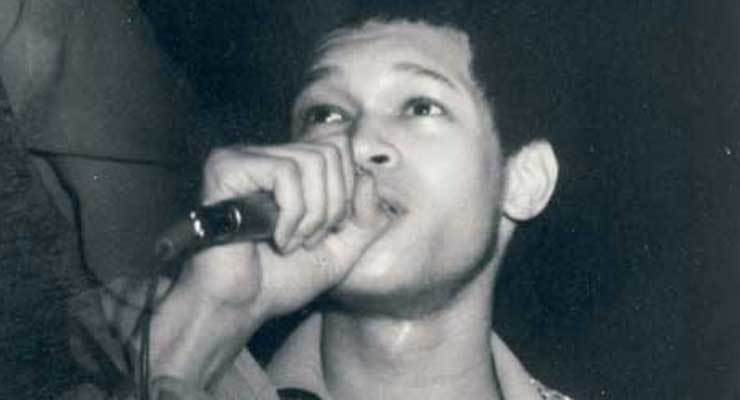
The Pain Gets A Little Deeper - LONDON HLU 10024 (1965)
I can remember writing that title and information down on a scrap of paper after one of the DJs played it at the Twisted Wheel in Manchester in the late ‘60s. I never found a UK issue copy at the time, or one of those beautiful, much cherished, London American yellow demos, a very hard release to find even in those days.The mass importation of USA releases hadn’t happened yet, so my collection of soul 45s comprised UK releases only. Things were about to change dramatically at the end of the ‘60s.
On my first trip to the US, in 1970, I found “Pain” and some of Darrow’s other releases on the Groovy label, in Chicago. In the ‘60s, we had very little access to information on artists like Darrow, or US soul releases. It’s very hard to understand, if you weren’t around at that time, the little we knew about soul artists compared to the easy access to information we have today. If an artist or group was fortunate to have an album released in the UK, the back cover notes were the only written documentation available to us, later magazines like Blues & Soul were invaluable to collectors. The Sunday night Mike Raven show on the BBC and others like Radio Luxemburg, pirate radio stations and the American Forces Network (AFN), were the only way to hear new releases. Reception on some of those radio stations was very poor and always seemed to fade away at the time when the DJ announced details of a record!
Well, I think that’s enough nostalgia, but I mention those times to explain that we had no idea that Darrow was only 14 years old when he cut the track “Pain” in the studio in Chicago in December 1965.
Well, time moved on, and after his UK performance at our own Cleethorpes Northern Soul weekender in 2006, and a US appearance at Brooklyn’s Dig Deeper concert in 2008, I wondered what Darrow was doing now. So, in 2010, I contacted Darrow and arranged to meet up in Chicago and do an interview. Much has been written about Darrow over the years, but hopefully we can find out a little more about his musical career and plans for the future. Before the details of the interview, I thought it would be appropriate to give the reader a little background on Mr. Darrow Fletcher.
Everyone predicted stardom for the young crooner, but often we hear tell of child prodigies frequently in the crazy world of entertainment, who never recapture their initial impact and are often forgotten as one-hit wonders. However, it was not so for Darrow. He had close to 20 singles in an active career, which spanned 9 labels and 13 years, many of which are cherished and collected by soul fans today throughout the world.
Born on 23 January 1951, in the Detroit suburb of Inkster, Darrow, when he was three years of age, moved with his family to Chicago. Whilst he was a freshman in high school (he attended first Hirsch and later South Shore schools), at the age of 14 in December, 1965, he recorded “The Pain Gets A Little Deeper”, written by Darrow and producer Ted Daniels, and cut with the help of his stepfather, Johnny Haygood. It was an impressive debut. It was a rough song for a 14 year old to get into, or so one would think, but Darrow belted it out as if he had just gone through a knockdown, dragged out divorce. The record was leased to Groovy, a small New York label owned by Sam and George Goldner and Kal Rudman. They got the record on the national R&B charts for seven weeks in early 1966, and as we all know, it was also released on London here in the UK.
Soon Darrow was touring the “chitlin’ ” circuit, playing venues like The Apollo, The Uptown and the Regal, where, in July 1966 he shared the bill with B B King, The Elgins, Stevie Wonder, The Capitols, Lee Dorsey, Jimmy Ruffin, and from Chicago the Sharpees and Jo Ann Garrett. I can remember Bob Pruter telling me that a ticket for a show like that back in 1966 cost just $1.25. Darrow also appeared on the Chicago version of The Soul Train, and Ken Hawkins’ World of Soul in Cleveland.
Following three failed follow-ups on Groovy, and dissatisfied with the final arrangements of the association, Darrow’s stepfather, Johnny Haygood, in 1966, formed Jacklyn Records, named after one of his daughters. Darrow cut three singles on Jacklyn — “Sitting There That Night” scored immediately, 2,500 sales for the record in Chicago alone. It was written by Haygood, with arrangements by veteran Burgess Gardner, and its marvelous Curtis Mayfield style guitar intro and brassy horns, made the record a genuine Chicago style classic.
In 1968, Haywood got a production deal with MCA, which gave Darrow releases on Revue, Congress and UNI. No hits developed out of MCA until 1970, with “I Think I’m Gonna Write A Song” in February, and “When Love Calls”, written by Johnny Moore and partner Jack Daniels, sold at least 6,500 in the Chicago area.
Darrow then moved to LA in 1974 to record for Ray Charles on his Crossover label. “It’s No Mistake”, in 1975, was an accomplished opener, and he had a minor hit with “We’ve Got To Get An Understanding” the following year. Crossover records had made a leasing/distribution deal with Atlantic so both of Darrow’s final releases were on their labels but the Crossover logo was clearly shown on the label face.
Darrow’s version of “The Rising Cost of Love”, backed by “Honey Can I”, are cherished by ‘70s/modern soul fans. His Atco single “Improve”, from the same period, has a very elusive B-side called “Let’s Get Together”. The more easily obtained demos are all double A sides. In the early ‘80s he returned to Detroit and around 1987 returned to Chicago, but not to the music business. Several deaths in the family, including his mentor and stepfather, Johnny Haygood, caused Darrow to suffer depression, but later involvement in the church, and more recently singing gospel and recent concert appearances has helped him recover. Before I left the UK I compiled a CD of all Darrow’s releases including “Hope For Love” which hadn’t been released at that time. During an earlier phone call Darrow told me that he hadn’t access to any of his songs and would really appreciate a CD so he could listen to the songs he created all those years ago. I told him that many of his tracks were available on Youtube, but that wasn’t much help as he didn’t have his own computer and only had limited access to one at his girlfriend’s house.
click to view in full
So the time had come to meet Darrow at his home on Chicago’s north side. When we arrived at the house, Darrow was already sat on the porch, so eager to get started. So, recorder and CD at the ready, we made our greetings and got into the interview.
DB Tell us a little bit about how you first got into the music business.
DF Well, it was through my father. He used to hear me sing a lot when I was young, well through my stepfather. He used to hear me in the back room, singing, and fooling around, you know, and he asked me — he said you really like to sing. Every time I look around you’re in the back room singing, you know. He say you want to sing professionally? I told him yes. I used to do talent shows and by the grace of God I always came in number one. I had a little group and we sang, like, a little doo-wop stuff, you know, and I was playing a guitar, and I really liked my guitar, I used to play you know. We went from talent show to talent show and my father said what would you really like? What’s one of your greatest desires? I said I want to sing in school, all the people in the school come to the auditorium to hear me sing. He said why can’t you broaden your scope. Laughing…. Would you like all the people all over the world to hear you? That’s all over the world. I said yeah. Laughing…
So anyway, talent show to talent show…next thing I know, my father told me to learn as many tunes as I could, and we wrote some songs together. And put them on tape. And that’s when he presented them to different record companies here in Chicago. And they liked the material and he went round a lot of different people, not just one person. The one that liked it, he said ok, he would get back with him, yet he went to other places as well, other record companies and they liked me, and he wanted to know what the best deal was, that’s what he was juggling about for, to make sure he got the right deal. Finally he got in with Groovy, the Groovy label. “The Pain Gets A Little Deeper” was my first recording and from there, I was doing shows and recording more records, and it happened between 65 and 79. Well, I moved to California in 74 because Ray Charles was interested in me, because he heard a few of my tunes that was presented to him by one of his representatives, an A&R woman for Crossover records, Pat Bush, she had seen me perform at the Regal and she said Ray needs to hear these, so she took them. She went back to LA, played them for Ray and Ray liked them and he called, had his secretary call my home and my father spoke with her. Ray sent me the money to go out to LA to record. He set me up in a hotel and I worked on some songs. I had four songs which we recorded in Ray’s studio.
DB What tracks did she take to Ray?
DF The ones that she took to Ray Charles was “Hope For Love”, “Changing By The Minute”, I think it was. There was a few others. “This Time I’ll Be The Fool”, that was Ray’s favorite, he loved that song.
DB “Hope For Love” was never actually issued was it? It was never made into a record
DF No, well, actually we only pressed up demonstration copies back then, but I made an agreement recently with Kent to release it on a CD in England.
DB Yes, that track was released in England on a Kent modern soul compilation quite recently. The track was originally found on an old studio spool of tape that record dealer John Anderson rescued some years ago from Chicago and was made available to the guys at Kent.
DF Anyway, Ray was very much interested. I came out there and he was my executive producer and I worked with him from 74 to 79. It was one year with a four year option. And before that, before 6 months went by, Ray was interested. He told me, he said, listen, I’m going to pick up the option. He took me with him to Chicago, to the amphitheatre. He said, I’m gonna call you out in the middle of my show and I want to you do that tune, “This Time I’ll Be The Fool”, and he played piano behind me and he was singing, moaning right along with me and he was saying, come on son, come on son. It was a thrill. After we got finished with the show and everything …
it was a beautiful experience for me. That’s basically how I got into the music, was through my stepfather. He said, I’m gonna make a star out of you. I recorded an album with Ray Charles, and what happened, he told me ok, he had a write up on the album and he had something to say, you know, just a sentence, just a paragraph, and it said he had mentioned about me, he said in his eyes, he said, he sees me ahead of time, in the future to be one of the major stars in the industry. He said because one thing that he noticed about me, he noticed that I was a hard worker, in others words, I loved to practice, and he said he’s got a lot of gut, you know, and he said he could see more soul in him than any one thinks Ray could see. He say, I can see your gut when you sing, you are very sincere. He.... I don’t know, it was a long time since I read that, but it was an honor coming from him, speaking about me.
DB It would be nice to get hold of that album. It wasn’t issued so it must have only got to the demonstration stage.
DF That’s what I was saying, that’s what I would like to do.
DB But the album was never officially issued.
DF It’s ok, I’m saying that I would like ….. when I call out there, and finally catch up with Mabel John, the lead singer of Raylettes, now that Ray has passed away, I can get in contact with her and ask her for my album. Just so I have can have it, cos I’ve misplaced my copy. And I need another one.
DB It was never issued officially because I’ve never seen it out there. From a collector’s point of view, if I’d seen something like that I’d have picked it up, and many other collectors would have done the same. From what you say about Ray’s words on the back of the album sleeve, he must have had all the art work and packaging completed. Ray must have pressed up a very small quantity of staff demos. I wish we could get hold of a copy of that demo album.
DF Now, once I get that album, then I believe that all the tunes I was looking for should be there. I wish you could hear “Sunny” and “Fever”. “Forever And A Day”, that’s another tune that’s never been released and Zane Grey has it, Zane wrote it. And I’m gonna ask Zane for it.
DB You weren’t you born in Chicago?
DF I was born in Inkster, Michigan. I was raised in Chicago. I would go back and forth to Detroit to visit my grandmother and spend the summer with my grandmother, and then I’d come back home to Chicago.
DB Did you get any influence from the Detroit music?
DF I’d get influence through my cousin, Rose Batiste. She used to sing a lot, when we were kids. I was, like, 5 and she was, I think 7 or 8 and she used to sing a lot and I admired her singing, and one day, I think she was, like, 13 or 14 years old and I heard her singing, and she sounded like Aretha Franklin, she could duplicate Aretha’s voice, that’s how good she was. Her dad, my uncle, was just like a proud peacock. Chest poked out and everything. He would take her to do nightclub work and she used to sing. Next thing I know she’s signed up with Motown. Next thing I know she moved to England, no, to Europe.
DB And you haven’t been in touch since.
DF I haven’t seen her since. I’d love to get in touch with her.
DB You haven’t had any mail or anything.
DF I have no idea where she is now, and I miss her. When I moved I lost all my phone numbers. Lost my phone book. What can I say? Eventually I may bump into her again, if I keep doing work out there, in England, or Europe. I may see my cousin.
DB Well, we’ll try to do something, see if we can track her down for you.
DF Give her my number, both of them.
DB What I’d like to do now, Darrow, is play a few tunes. I know it’s a long time back but if you can relate to that time, and if there were any other artists, producers, session musicians who we might know, involved in the sessions, because most of those tracks were recorded in Chicago or Detroit, even though some of them were leased out to other record companies.
DF Yes. Except for the ones in California, they were recorded with Ray Charles.
DB What about “Pain Gets A Little Deeper”? Your first one.
DF My very first one.
DB You were involved in writing that as well.
DF Yes, yes, a little, because I wrote the tune with my father, as matter of fact I wrote a couple of tunes, I may have wrote some with someone else. But those two in particular, “Pain Gets A Little Deeper” and “We’ve Got to Get An Understanding”. I did the music to “Pain”, I didn’t write the words. “Sitting There That Night”, my father and I wrote it, and “Understanding”, Joel Webster, which was Mabel John’s son, and I, wrote “Understanding”.
DB “Understanding” was one of the later tracks, one of the Crossover tracks. When I look at the records and pick up the names on the records, there’s Ted Daniels on there, Don Mancha, where did they fit in? Were they involved right from the start?
DF Well, Ted Daniels, he was a producer, he’s deceased.
DB He used to be in a doo-wop group years ago.
DF No, Ted never was in a group, he was a producer and he wrote songs, but he was never in a group, He never sang or anything. Don Mancha was a songwriter.
DB Don Mancha has passed away now hasn’t he?
DF Yes, I heard he’s passed away. Ok, you remember Johnny Moore.
DB Yes, he was my good friend.
DF Yes. I understand he passed away?
DB Yes, Mother’s Day, 2005.
DF I’m sorry to hear about that. But, I remember someone telling me that he passed away. But he was another guy that wrote for me. And there was another guy — Maurice Simpkins, he wrote several tunes for me. But mostly the ones that I mention are on your CD.
DB Tom Washington did some arranging for you as well.
DF Yes. Tom Tom, he’s known as Tom Tom. I remember he did two tunes: “Changing By The Minute”, and “When Love Calls”. I remember those. He may have done something else too, but those two I can remember.
DB You mentioned to me a few days ago that the Chi-Lites did backgrounds on some of your songs.
DF The Chi-Lites sung backgrounds on “Changing” and “When Love Calls”.
DB They were recording for Carl Davis at that time and then went on to record on Brunswick.
DF Yes. Brunswick, that’s a long time since I heard that name. Yes, that was back in the late ‘60s or early ‘70s.
DB Yes, that’s about right. I think “Changing” came out in 1970.
DF 1970. Yes, I was 19 years old.
DB And then you did another Johnny Moore penned song, called “What Is This” and “Dolly Baby”.
DF No, Johnny Moore didn’t write “Dolly Baby”. Don Mancha wrote “Dolly”, he wrote “What Is This”. Now, Johnny Moore wrote a tune for me that has never been released, “Together”, that’s the name of it. I don’t understand why it was never released. I wish I had the tune, I recorded it.
DB Was that while you were in Chicago, before you went to California?
DF That was before I went to California.
DB Johnny Moore wrote “Now Is The Time For Love” and you had Part 1 and Part 11 on that, that was a long track. I believe Bernard Reed played on that.
DF Who? Bernard Reed the bass player, yes.
DB He played on that track. I think he co-wrote the track as well. I think the credits go to Johnny Moore and Bernard.
DF Ok. But they never released “Together”. I don’t understand what happened. I wish there was some way I could contact somebody who had these tracks.
DB All Johnny’s tracks I’m familiar with. He had very little left at home, a lot of his stuff got lost, and that track wasn’t amongst his stuff he still had. He was in the same situation as you, Darrow, when you move about you don’t always carry all your things with you.
DF You thought you did, but when you get where you’re going, you don’t see it.
DB What about the Jacklyn label? That was your father’s own label wasn’t it. Why did he decide to do his own label? Previously he had leased everything to New York, to Groovy.
DF Well, because money ideas came into his mind. He said, well, if the record companies can do it, why am I sending them something that I can do, you know. The record company said it was gonna take a lot of money to promote these records, maybe I need to lease first and give them some of the action, just so they can be released. I can ride with that and get some more information and some more money, then I’ll open up my own company and do my own promotion. Because he knew it took a lot of money.
DB Did he have any other business besides that?
DF Well, he had a production and publishing company, and a record company, That was about it,
DB He didn’t do anything else for a living? He didn’t have another job?
DF At first he was a car salesman, he sold Cadillacs. But after that, he just drifted into the music. He was listening to me, and he could hear me going further than just singing in the back room. And he just took a poke at it. He had faith in my voice and he knew I could sing just as good as anyone else out there. Let’s give it a try.
DB What about recording studios? Where did you cut most of the tracks?
DF In Chicago. It was at Universal Studios, and some other places too, I just don’t know the name of these studios. We went to different studios, we went to some in Detroit.
DB You cut some tracks in Detroit then? Cos Mike Terry arranged “What Good Am I Without You” on Jacklyn, 1967. I think that had a Detroit connection.
DF On a couple of occasions I can remember, I just don’t remember the names of the studios.
DB At least we know now that they weren’t all recorded in Chicago, some were done in Detroit.
DF Yes, and California. And then, after ‘79 I hooked up with a band called The Best Of Things. We did some demo copies, two tunes in particular, one is called “Crazy About You”, and the other one… these were demonstration copies. Folk were biting at them, and they wanted me to sign right away and I said aarrgghh! wait a minute, I gotta see some contract, I want to see what’s going on, you know. They gave me a contract, here it is right here, just sign it right here. And there I was, trying to read it, I’m trying to see, I tell you what, let me look this over, and see you in a couple of days. Couple of days? What’s going on here, why don’t you want to sign it right here.
DB You wanted to think it over before you signed it.
DF Yeah, I didn’t want to rush into it. I’d rather take my time. If you sign on the dotted line you might be signing your life away.
DB If you don’t read the small print! Those demos you cut with the band. Have you got any way of getting hold of those tracks.
DF No, I wish I could get them, I really do.
DB Where were they cut?
DF In California with The Best of Friends. We did some beautiful shows, man. Some exciting shows.
DB Would Zane Grey have those?
DF No, he didn’t know anything about them.
DB That was after your association with Ray Charles?
DF Right. See, it was a different situation altogether.
DB But you actually cut demos.
DF Yes. They was demonstration copies, we wanted to present them to record companies. That’s what I wanted to do.
click to view in full
DB We’ll play a few of these tracks and see if anything else comes back in your mind while we play them.
(playing tracks)
“Pain” — we’ve talked about that so we’ll move on.
“My Judgement Day” Playing
DB You wrote this as well?
DF No Maurice Simpkin wrote it.
“My Young Misery” playing
DF Ted Daniels wrote this song and I wrote the music.
DB And that didn’t do as well as “Pain” did it?
DF No, “Pain”, that was the one. But this tune, it’s a good tune. They remembered that when I appeared in New York.
DB They love it in England as well.
“Gotta Know Why” playing
DB That was the flip.
“Gotta Draw The Line” playing
DB Did you know the Three Degrees actually recorded this?
DF Did they, wow, I never heard that.
DB On their Swan label out of Philadelphia.
DF Ok
DB That song was written by Richard Barrett, presumably for the Three Degrees, it was released in 1965.
“That Certain Little Something” playing
DB After this track your father decided to produce records on Jacklyn rather than go to New York.
DF Yes
“What Have I Got Now” playing
DB Who wrote this Darrow?
DF Maurice Simpkins
DB He was doing most of your writing at that time?
DF He was an excellent writer. Not only would he rhyme the last word in every sentence, but sometimes he would rhyme the front, the middle and the last, you know, he would rhyme the words in the story.
DB Well, a lot of these songs have deep stories, deep meanings. We were surprised at the way you sung these songs, you were so young at the time, about the circumstances of love affairs and things, yet you were only 14. You hadn’t really lived the experiences at that time.
DF Well, some of them I could relate to. And I think he was trying to write based around some of my experiences. And then some of them were something he had experienced, you know.
“Sitting There That Night” playing
DF This is me on the guitar. I played guitar solo on this. I was singing and I was 14 and a half when I recorded it. That was one of the first tunes, right along with “Pain”. I recorded that the first year I started recording.
DB So that was kept back and released later on. I think you actually used it as a flip side on some others. A lot of people think this is one of your best tracks.
DF Really? I didn’t know that.
DB Bob Pruter, who I’ve been talking to today, when I mentioned Darrow Fletcher, he mentioned this track as one of his favourites. He’s lived in Chicago all of his life and thought this was one of your best tracks.
DF My father wrote that, I put the music to it. And I practised and practised on the guitar until I got my solo, till I got it right, the way I wanted it to be, then I recorded it.
DB Did you play any other instruments?
DF I played drums, I sang and played drums and stuff at shows and school.
DB The guitar solo just sounds like Curtis Mayfield playing.
DF I know, that’s what I was trying to do. I used to love to listen to him.
“Infatuation” playing.
DB You were 17 at that time?
“Little Girl” playing
DF That’s the B side. Just to fill in.
DB That would be recorded here, in Chicago? Sounds like a Chicago record.
“What Good Am I Without You” playing
DB That’s Detroit.
DF It’s real nice.
DB Don Mancha co wrote the track?
DF Don Mancha wrote it. Mike Terry arranged it. Mike was a horn player, arranger and producer. He played on a lot of Detroit tracks and Motown.
“Hope For Love” playing (unissued at the time)
DF This is the tune she took, Pat Bush, the A&R woman, to Ray Charles.
DB So what sort of date would this be? Just before you went to California.
DF Yes. It was recorded in Chicago.
DB Was it recorded in Chicago, around the time your songs were being leased to MCA?
DF I recorded it before I went to California.
“The Way Of A Man” playing
DF This is also before I went to California.
DB I would imagine now we’ve got a situation where your father tried to do the label himself, wasn’t getting the distribution he would have liked, so he started leasing things out again.
DF He wanted to let somebody deal with it that does it every day. That would give him more time to learn more about the business. He didn’t want to spend too much money on something he didn’t really know too much about.
“Those Hanging Heartaches” playing .
DB 1969 now. Who’s involved in this one?
DF Maurice Simpkins. Again.
DB Is Maurice about or has he passed away?
DF No, he’s still here that I know of, but it’s a long time since I talked to him. The guy used to be about 450lbs, but now, the last time I saw him, he had lost a lot of weight. He looks better.
DB How long ago was that?
DF Maybe about 4 years ago. I don’t know if he’s at the same place or what.
DB That was in Chicago.
DF Yes right here in Chicago.
“I Think I’m Gonna Write A Song” playing
DF Don Mancha wrote this.
DB This one got leased to Congress, another part of MCA.
“When Love Calls” playing
DB Johnny Moore wrote this. Who’s playing piano?
DF Johnny was playing. Yes.
DB I thought so! Was this cut at Universal? I know Johnny did a lot of work at Universal.
DF Yes.
DB Did you cut anything at Paul Serrano’s PS studio?
DF I seem to remember that name. I don’t know if it was his studio or not, but I remember recording. It’s a long time ago. I was a child, I was a teenager. Maybe 16, 17, 18.
“Changing By The Minute” playing
DF You remember Zane Grey, he wrote the song. This was his very first song, I taught him how to write.
DB You must have made a good job of it, cos he made a career out of it.
DF Oh yes. He told me, I would never forget you. You’re the reason for me being in the music. He showed me a tune and sung something that he wrote. I had confidence in him. I said, we get the strong points and hold that, the others throw away and add to the strong points. I said you get the credit cos it’s your song. Every time you look at it think of what you can do to strengthen it and make it as strong as you can make it. Len Ron Hanks, his partner, laid down the music. He plays piano.
DB Tom Tom did some arrangements, he did some strings and stuff on there.
DF Horns, the strings. He arranged the whole thing.
DB It’s a great tune.
DF When we started doing that song with Zane and Len Ron we were bouncing off the walls. We were bouncing off the walls. We were excited, like popcorn in a hot skillet.
DB Well the first time I ever heard that track I was excited. Just hearing the track, years ago.
DF Zane couldn’t keep still in the studio. I said you ok man? Man, man, he says, come on man, let’s do this. It was exciting, yeah.
DB Did it sell well in Chicago?
DF In Chicago it did great. Well as a matter of fact “When Love Calls” was what they released, right, and then some DJ was listening to the other side and he said I’m gonna play this other side. And next thing you know folks were requesting it, and the more you play a tune, the more people hear it, the more it start growing on them.
DB Then they want to buy it for the flip side.
DF Yes. The next thing you know it was an A and A side. A and A. Now here in Chicago, it took off.
DB It’s a shame it didn’t do more out of the city. But it’s a great tune, cherished by many soul record collectors today all over the world.
“What is This” playing
DB Another Johnny Moore track. I can remember, Johnny reminiscing about cutting this track, he really liked the song.
“It’s No Mistake” playing
DF This tune was never released because it wasn’t produced right. Too much echo and stuff. Ray Charles did that on purpose because he didn’t want anyone to steal that song. This was during the time when he wasn’t finished mixing it. He wanted to make sure if anybody heard it they couldn’t bootleg it. The mistakes weren’t really mistakes, he put them in there.
DB Then he must have finished it, and went ahead and put the track out on a 45 and sold it nationally.
DF But I don’t understand why.
DB I also like the flip side.
DF Joel Webster wrote that, Mabel John’s son. Joel became staff producer with the company as well as a performer and composer. He produced this, my first session for the company with Ray supervising.
DB Did you sing this on the show in New York?
DF No, I didn’t do that one. They requested the tunes that they wanted me to sing, so that’s what I did. It’s always important to know what the public wants to hear.
DB If you were in UK again you would definitely have to sing that one. That’s got a real big following. It’s an anthem.
“Rising Cost Of Love” playing
DB I played this and the flip “Honey Can I” to Syl Johnson last night. He thought they were both great songs.
DF I can’t understand why they didn’t do anything with them.
DB Both were leased out to Atlantic. It’s still stated that it was a Crossover production when it was released on the Atlantic label.
DF I didn’t know they had been released, I cut those songs for the album. I’m wondering if they are still selling.
DB You can’t get hold of those tracks on the original label. The record was deleted years ago, it’s a real collectors piece now. Very few copies must have been pressed at the time, 1979 I think, with very limited distribution.
DF I don’t know what’s going on in England cos I’m not out there, it seems to me that this record should still be selling right now. These tracks were for an album that we cut in LA.
DB “Rising” - has been released on a various artists CD album with other Atlantic tracks.
DF People gotta hear something more than once. For some maybe one time but they probably played all the other tunes, might have played mine once or twice over a few months. I need some concentrated airplay.
DB The thing that worries me is when people release your tracks on a various artists’ compilation, you don’t get the exposure you need, you’re just one artist amongst a mixture of all the others. You need an album of your own, all your products, which is what I was trying to do. You need a Darrow Fletcher full story album out, then people will listen to your stuff.
DF And after all that’s gone, that albums finished, I haven’t any more material, other than me recording something fresh. That’s what I would really like to do, record something fresh. But something’s gonna work out, Zane has a studio and he’s thinking seriously about recording something fresh with me. He’s always wanted to do that but I was always involved in something else and he couldn’t really get to me yet. I told him I wanted to start singing gospel, but I don’t know what’s gonna happen yet. But I’m think I’ll end up recording in his studio.
“Honey Can I” playing
DF That’s the tune I should have released, this tune right here, I know it man.
DB If I do a radio show or I DJ at a dance, I always play that track. One of my favourite tracks.
click to view in full
Soul Man Darrow came up in the time when albums were not the typical format of soul music. Yes, we had LPs in 1966, but the concept of a soul album was still just a gleam in the eye of folks like Isaac Hayes and Marvin Gaye. Although Darrow had had an active career with many singles to his name, he never made an album.
Well! That’s not strictly true is it. As we can gather from this interview, he may not have released an album but he certainly made one, and was working on a second. When Darrow was recording with Ray Charles’s newly formed Crossover records, he was concentrating on completion of his first Crossover album. The studio work was actually finished in 1975; it would seem that artwork and sleeve notes by Ray Charles and packaging were completed, and the final album was due for release early the following year, But no release ever materialised, and the album was presumably shelved for some reason in the RPM Studios in LA. It seems, according to Darrow, that a few staff demos were produced, he once had a copy and friend Mabel John had one. Unknown to Darrow, some of the tracks planned for the album were, in fact, released by Crossover in the mid ‘70s and others by the Atlantic group in ‘78/79.
click to view in full
Whilst I was in Chicago interviewing Darrow, he showed me a contract he had signed with Kent records here in the UK. That was back in 2006, at the time of his appearance at the Cleethorpes weekender. He was concerned that, to his knowledge, nothing much had been released and asked me to find out what was going on, and try to push things along.
Over the years Kent records have re-issued seven of Darrow tracks on their compilation CDs and vinyl singles, but each are on separate compilations that would not particularly lift Darrow’s profile. But guess what!
After 37 years in the can, the guys at Kent have got hold of the Crossover album masters and are going to release it on CD. The CD release will contain all the issued Crossover tracks, and wait for it — no less than nine mouth watering previously un-issued recordings that were planned for Darrow’s album back in 1975.
Stand out tracks, amongst others, are “Love Is My Secret Weapon”, “How Can You Live Without Love”, and “What Are We Gonna Do About This Mess” and for those of you who wonder what the elusive Atco track “Let’s Get Together” sounds like, that’s included too. Every track is from a master tape, several mixed down from the 24 track multis.
For good measure, Kent are later releasing a CD featuring all of Darrow’s ‘60s output. Darrow’s ‘70s CD will be released at the end of September this year and his ‘60s CD follows early next year. At long last, Darrow will have his anthology out there, spread across two CDs, something he’s been waiting for, for a very long time.
If that isn’t enough, Darrow is coming over to the UK in November this year to do three concerts and promote his CD releases. So come on guys, get yourselves to at least one of these concerts and thank Darrow for all the wonderful soulful music he has created for our enjoyment over the years. Darrow will also be selling his new Kent CD and 45, at a special price, so get a signed copy and save a few bob.
Thurs Nov 1st, 8pm - 2am @ The 100 Club - Darrow Fletcher is playing live with backing band for the celebration of 30 years of Kent Records. DJs Ady Croasdell, Tony Rounce and more. Tickets £18.00 will go on sale at the 33rd Anniversary allnighter on September 29th, and by post from Oct 1st (details will be announced in September). www.6ts.info
Nov 2nd. — 4th at the Scottish Soulful Weekender at the superb 3 star Cairndale Hotel in Dumfries. Darrow Fletcher is playing live on Saturday Night with backing band. Full details are available at www.scottishsoulfulweekender.com
Darrow will be supported at both these concerts by a great backing band — Push.
After that hectic weekend, Darrow will take a few days off before taking the stage again in good old West Yorkshire. Before returning home to Chicago
Saturday Nov 10th 9pm - 3am at the Wilton - Wheatsheaf Conference & Banqueting Complex in Castleford, home for almost 20 years of the famed Wilton Allnighters.
The Wilton guys Mouse & Boxy are staging their second Soulful Sessions Night, and are so proud to have Darrow performing to specially made backing tracks, some made from the original master tapes: a selection of his ‘70s songs from the CD and a few ‘60s classics at the venue.
DJ support from Arthur Fenn — Mike Charlton — Gary Walsh, and residents Boxy & Mouse, should make a cracking night. So come on guys, if you can’t travel to London or Scotland, then here’s your chance to see Darrow for the very first time in Yorkshire.
Advance tickets £12.00 will be on sale at our next allnighter on the 21st September and are now available online by Paypal & Credit Card at the Wheatsheaf website http://www.wheatsheaf.com/allnighter or £15.00 otd.
click to view in full
DARROW FLETCHER’S DISCOGRAPHY
Groovy 3001 — The Pain Gets A Little Deeper / My Judgement /Day — 1966
Groovy 3004 — My Young Misery / I Gotta Know Why — 1966
Groovy 3007 — Gotta Draw The Line / I Gotta Know Why — 1966
Groovy 3009 — That Certain Little Something / My Judgement Day — 1966
Jacklyn 1002 — What Have I Got Now / Sitting There That Night — 1966
Jacklyn 1003 — Infatuation / Little Girl — 1967
Jacklyn 1006 — What Good Am I Without You / Little Girl — 1967
Revue 11008 — The Way Of A Man / I Like The Way I Feel — 1968
Revue 11023 — Gonna Keep Loving You / We Can’t Go On This Way — 1968
Revue 11035 — Those Hanging Heartaches / Sitting There That Night — 1969
Congress 6011 — I Think I’m Gonna Write A Song / Sitting There That Night — 1970
Uni 55244 — When Love Calls / Changing By The Minute — 1970
Uni 55270 — What Is This / Dolly Baby — 1971
Genna 1002 — Now Is The Time For Love Part 1 / Part 2 — 1971
Crossover 980 — Try Something New / It’s No Mistake — 1975
Crossover 983 — We’ve Got An Understanding / This Time I’ll Be The Fool — 1976
Atco 7083 — Improve / Let’s Get Together — 1978
Atlantic 3600 — Rising Cost Of Love / Honey, Can I —1979
Kent CD 310 — Hope For Love — 2009 (UK)
Kent Select 024 — No Limit / What Good Am I Without You — 2012 (UK)
David & Val Box 2011/12
Special thank you to Darrow Fletcher for taking the time to do this interview.
Acknowledgements, as always, to Robert Pruter “Chicago Soul”, and Adrian Croasdell, Ace Records,
click to view in full
-
 1
1
-
 1
1


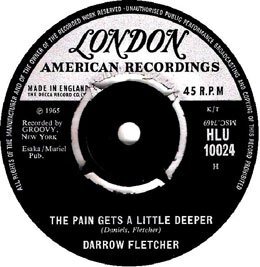
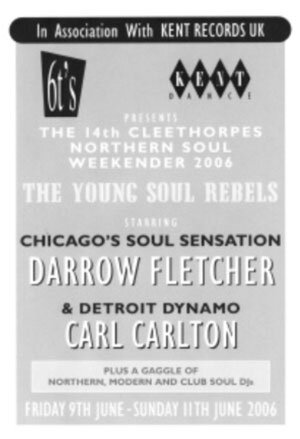
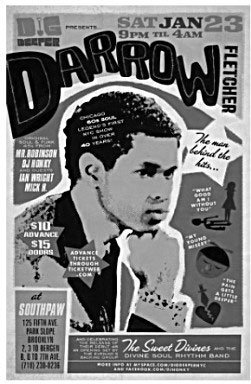

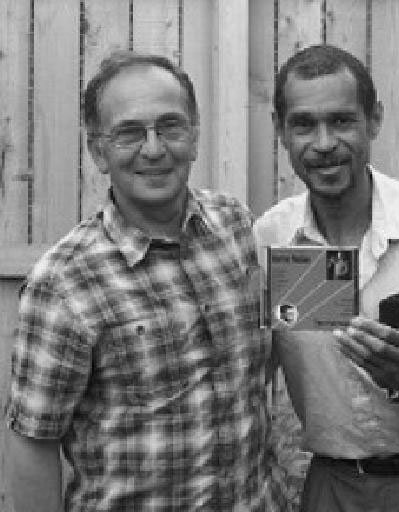
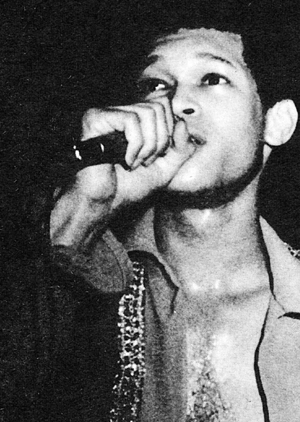
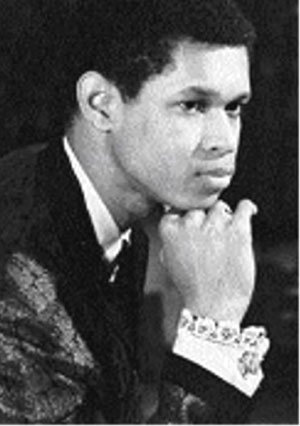
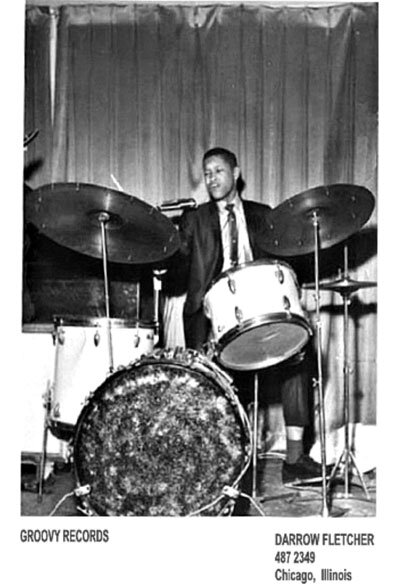


Recommended Comments
Get involved with Soul Source
Add your comments now
Join Soul Source
A free & easy soul music affair!
Join Soul Source now!Log in to Soul Source
Jump right back in!
Log in now!